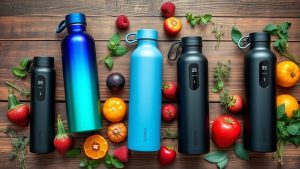
Your daily water intake depends on various factors like your body weight, age, activity level, and environmental conditions. Generally, you can base your hydration needs on half your body weight in pounds, quantified in ounces. Hot weather, physical exertion, and dry climates can increase your requirements. Vulnerable groups, like children and the elderly, may need special attention. Understanding these factors helps you stay hydrated, leading to better health outcomes. There's more to reflect upon, so keep exploring!
When it comes to staying hydrated, understanding the factors that determine your daily water intake is crucial. Your individual characteristics play a pivotal role in how much water you should consume. For example, a simple calculation to estimate your water needs is to take half of your body weight in pounds and drink that amount in ounces daily. Generally, men need more fluids than women, averaging around 2.6 liters (10 cups) for men and 2 liters (8 cups) for women.
Understanding your unique hydration needs is essential; a simple calculation can help you determine your daily water intake.
Additionally, your age matters; older adults may require less fluid depending on their activity levels. If you have a fast metabolism, you might need more water to keep your bodily functions running smoothly. Also, health conditions can necessitate an adjustment to your intake, often increasing how much you should drink. Pregnant or breastfeeding individuals should particularly be aware of their increased hydration needs.
Environmental factors greatly influence your hydration needs, too. If you live in a hot or dry climate, you'll likely need to drink more water to avoid dehydration. During warmer seasons, your body loses fluids more quickly due to increased perspiration, so you should compensate by upping your intake.
Altitude also plays a role; higher altitudes can lead to quicker dehydration, necessitating greater fluid consumption. Furthermore, consider humidity; low humidity environments can exacerbate the risk of dehydration, prompting you to drink more frequently.
Your lifestyle choices further affect your hydration requirements. If you're physically active, you'll need to replenish fluids lost through sweat, which means drinking more water. Notably, a diet rich in water-containing foods like fruits and vegetables can reduce the amount of plain water you need to consume.
Your work environment matters, too; if you have a physically demanding job, you'll likely require more hydration. Activities like sports or long-distance running increase your fluid needs considerably. And if you travel to new climates, be prepared to adjust your water intake accordingly.
Dietary contributions to hydration shouldn't be overlooked. Other beverages, including milk, juice, and tea, do add to your daily hydration needs. However, keep in mind that caffeinated drinks can have a diuretic effect, potentially decreasing your net hydration.
Eating high-water foods can be beneficial, as these contribute to your overall fluid intake. Furthermore, considering meal timing can help; drinking water during meals aids digestion and can keep you hydrated.
Certain health considerations also come into play. Pregnant or breastfeeding individuals typically require an additional 24 to 32 ounces of fluids above the baseline. Some medications can affect hydration levels, making it essential to increase your fluid intake.
Vulnerable groups like children, the elderly, and athletes are particularly at risk for dehydration. Monitoring your urine color and output can be an effective way to verify you're drinking enough water.
Ultimately, while recommendations generally suggest about 2-3 liters (8-12 cups) of total fluid daily, you should prioritize plain water as the primary source of hydration.
Conclusion
In summary, knowing how many bottles of water you need daily isn't just a guessing game. Factors like your activity level, climate, and overall health play an essential role. Remember, "you can lead a horse to water, but you can't make it drink." So, listen to your body's signals and stay hydrated. Aim for balance, and adjust your intake according to your lifestyle to guarantee you're giving your body the hydration it needs to thrive.



